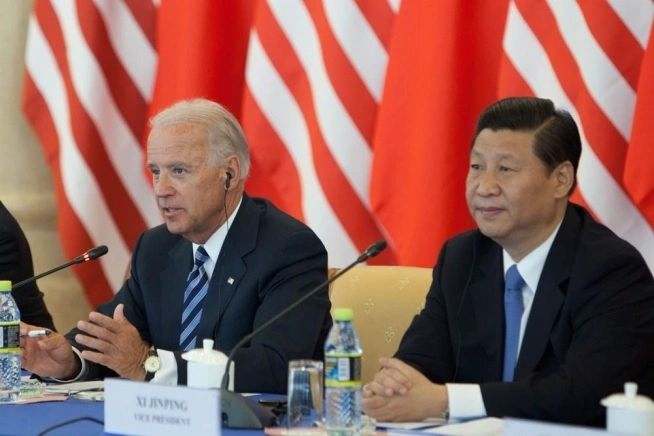

US President Joe Biden and Chinese President Xi Jinping talk for over two hours (Photo: IANS)
<p>
American President Joe Biden and his Chinese counterpart Xi Jinping had a lengthy phone discussion on Thursday to defuse mounting tensions over Taiwan. Despite friction over Taiwan, they managed to agree to hold an in-person summit as well as work on climate change issues.<br />
<br />
The candid discussions also had the US telling China not to change the status of Taiwan while the latter warned that the US should not play with fire.<br />
<br />
This was the fifth round of talks between the two leaders after Biden took over as President in January 2021. The talks were held under the backdrop of increasing tensions over US Speaker Nancy Pelosi&#39;s impending visit to Taiwan, which has been postponed earlier this year due to a bout of Covid-19. Beijing has threatened direct action if Pelosi visits the island nation while the US feels that it has to show support for the beleaguered democracy.<br />
<br />
In the discussion. which lasted about two hours and 17 minutes, Washington reiterated its position over the One China Policy (OCP) while stressing that China will not make unilateral changes to the status quo of the island nation and will maintain peace and stability across the Taiwan Strait. The US, under the OCP does not recognise Taipei officially although it maintains strong trade and defence relations.<br />
<br />
A short White House statement said that an outcome of the talks was to keep &quot;an open line of communication&quot; on the Taiwan issue.<br />
<br />
The press release by <a href="https://www.whitehouse.gov/briefing-room/statements-releases/2022/07/28/readout-of-president-bidens-call-with-president-xi-jinping-of-the-peoples-republic-of-china/">the White House said</a>: &quot;The two presidents discussed a range of issues important to the bilateral relationship and other regional and global issues, and tasked their teams to continue following up on today&rsquo;s conversation, in particular to address climate change and health security. On Taiwan, President Biden underscored that the United States policy has not changed and that the United States strongly opposes unilateral efforts to change the status quo or undermine peace and stability across the Taiwan Strait&quot;.<br />
<br />
In a much longer statement, <a href="https://www.fmprc.gov.cn/eng/zxxx_662805/202207/t20220729_10729593.html">Beijing said</a>: &quot;China firmly opposes separatist moves toward &ldquo;Taiwan independence&rdquo; and interference by external forces, and never allows any room for &ldquo;Taiwan independence&rdquo; forces in whatever form. The position of the Chinese government and people on the Taiwan question is consistent, and resolutely safeguarding China&rsquo;s national sovereignty and territorial integrity is the firm will of the more than 1.4 billion Chinese people&quot;.<br />
<br />
The Chinese statement added that the two sides need to maintain communication at all levels. It added: &quot;Recognizing the many challenges facing the global economy, President Xi underscored the need for China and the US to maintain communication on such important issues as coordinating macroeconomic policies, keeping global industrial and supply chains stable, and protecting global energy and food security&quot;.<br />
<br />
Besides discussing the simmering issue of Taiwan the two Presidents also discussed climate change, health security, counter-narcotics and Russia&#39;s war in Ukraine.<br />
&nbsp;</p>
Union Minister Hardeep Puri on Tuesday highlighted Central Government's series of sweeping policy reforms under…
The World Food Programme (WFP) has once again raised alarm over the worsening humanitarian crisis…
The Tibetan and Korean Buddhist communities in Busan came together to celebrate the 90th birthday…
Taiwan plans to ask its diplomatic partners and friendly nations to bring up China's unilateral…
Google has rolled out AI Mode feature for all users in India, which will make…
71-year-old physician and veteran lawmaker Jennifer Geerlings-Simons has been elected as Suriname's first female president,…